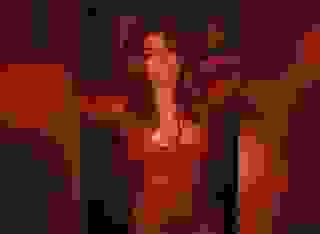Note: You can change font size, font face, and turn on dark mode by clicking the "A" icon tab in the Story Info Box.
You can temporarily switch back to a Classic Literotica® experience during our ongoing public Beta testing. Please consider leaving feedback on issues you experience or suggest improvements.
Click here"Okay," I said. "Before we make any decisions we need more information. I'll broadcast a news update as soon as I can, and if you have questions or concerns let's tackle those soon."
Haiku dropped power and Carolyn was waving at me, so I altered course and closed on her, and a few minutes later I pulled alongside -- and then Patrick stepped out of the inside steering station.
"Are you sure you want to take on this kind of responsibility?" he asked -- kind of sarcastically, I thought.
"The alternative is what, exactly, Patrick?"
"Let them make their own way to wherever it is they want."
"I see. What are your plans?"
And then Patrick shrugged.
"I see," I nodded, now understanding where I stood in his world.
"It's nothing personal, Neal. I'd imagined you'd be heading south now, whereas I'll be heading west."
"Japan? My god, Patrick! Won't you need medical intervention sooner than that?"
"Not my main concern. Besides, there aren't exactly many options just now, Neal."
"Try UC San Diego; I should think they'd still be intact. Why don't you see if you can't contact someone down there? With your speed, you could be there in under two weeks."
"Well, I have a bit of a problem in that regard, Neal. I'm the only person onboard with any sailing experience."
"What?"
"There was no need to engage the services of a captain while Haiku was simply sitting there tied up in that marina."
"Holy shit, Pat. Carolyn can't sail? Or her friend?"
He shook his head.
"I'm sorry if this is none of my business, but who was the woman we picked up at that house?"
"Akira. My daughter."
I tried to hide my reaction to this bit of news but probably wasn't too successful. "Where is she now?"
"Below," he sighed. "She is quite angry with me, I'm afraid."
"Angry?"
"Yes. In fact, I may need help with that."
"Uh-huh," I think I managed to say. Oh, how the worm turns.
+++++
It fast became apparent after my first broadcast that our little flotilla was breaking down along the usual lines: left and right, as in liberals and conservatives. Even now, even as mutually dependent as many of these sailors were, the usual walls started falling into place. Bigger boats didn't want to share fuel or water, and heaven forbid if you were low on perishable food or canned goods. Patrick had the largest yacht out there and he'd already made it abundantly clear he wouldn't share a damn thing with anyone. Myself included.
Then again, he was dead set on setting out for Hokkaido, a 4,300 great circle route that would take him as far north as the Aleutians. Pointing out that this would be against wind and current, that left him with a more leisurely alternative jaunt via Hawaii, a six thousand mile trip that would strain the physical resources of any fully crewed yacht, let alone an octogenarian in full-blown kidney failure trying to single-hand a 120-foot super yacht across one of the most challenging bodies of water on the planet. Whatever he tried, he'd need every bit of food and fuel he had stowed away, so at least I could understand his point of view.
Tiki could just conceivably make the 3800-mile trip to Papeete, Tahiti -- with one stop in the Marquesas Islands to take on more food. Assuming I could find someone willing to sell food to me once I got there. I had a watermaker on board so could turn sea water into fresh -- as long as I had enough fuel to run the ship's diesel. If we ran into the doldrums, or the Intertropical Convergence Zone, Max and I could conceivably sit there bobbing about like a cork for weeks on end, and while I had four solar panels making 800 watts on a sunny day, things could get real dicey, real fast. The more I thought about it the more San Diego made sense, and surely things would be getting sorted out after the two to three weeks it would take us to sail down the coast.
But as I listened to CNN the more unsettled and unrealistic that first rosy outlook now seemed. Preliminary damage estimates to the Pacific Northwest region appeared to be in the tens of trillions of dollars, and entire harvests in California and the mid-American agricultural heartland were now more than questionable -- and would remain so for years -- and some scientists were saying it was beginning to look more than possible that a prolonged period of extremely cold weather could encircle the globe for up to a decade -- because it seemed that no one had foreseen three large volcanos cutting loose at the same time.
And now, suddenly and unexpectedly, it was looking like my little ocean-going cocoon might just prove to be one of the most reliable ways to get through this calamity -- at least assuming the weather didn't go completely batshit crazy. Maybe that was why billionaires had been building mega yachts for the past ten years.
And now all I had to do was get Barnacle Bill to start thinking clearly.
+++++
So, as I passed along events during my next radio session, I passed along what I'd just learned from CNN and the BBC, and that proved to be a peculiar moment. Peculiar -- because it was as though we could all feel a collective sigh drifting among the little island of humanity that was our little flotilla -- and what happened in the aftermath of that moment was nothing short of miraculous.
That wall, and all those partisan divisions among us, began to fall away.
A social studies teacher on our net talked about the possibility of near total cloud cover resulting from all the ash circling the planet, and how that might, just might, bring on something like the so-called 'little ice age' that had happened a couple hundred years ago. The southern hemisphere might not experience these conditions, she added, or might not to the extent the northern hemisphere might.
"So," another member of our net said, "you think we all need to head south too?"
And that forlorn, lost-sounding voice came back on just then: "I'll never make it," we heard the woman on the small boat say again. "I wouldn't make it to Oregon, let alone Hawaii."
"Then come on over and join us on Silver Bear," another member of our new group said. "We've got tons of food and a water-maker, and plenty of room, too."
So we started to sort through the people out there; who was on too small a boat and who had room to spare. Who had a water-maker, but maybe not enough fuel, or food. We were westbound now, heading towards Tatoosh Island and the Cape Flattery lighthouse, but already the sky looked peculiar -- like there was a pewter-green colored layer high up in the stratosphere, and the winds had died down to nothing -- which produced another sort of foreboding.
"Barometric pressure is 30.15 and rising," Pat said over the net, "but there's something that looks like a typhoon between Guam and Honshu; at last report, it was turning northeast, towards the Aleutians, and there's another deep low in the Gulf of Alaska."
"What direction is that storm headed?" someone asked.
"Southeast," Pat replied. "It should be here in four days."
It was my turn now. "So you think we'd better head south now? Any idea what the weather in the Caribbean is doing?"
"Something organizing west of the Cape Verde Islands," Pat added, "but the NOAA sea surface temp map is showing 88 degrees in the central Gulf of Mexico, so it won't take long before a storm gets organized there."
"Don't the storms that form there sometimes jump across to the Pacific and head towards Hawaii?" the voice on Silver Bear asked.
"Yes. That's a possibility," Pat said. "Your best bet may be to thread the needle, head to the Marquesas."
And on hearing the words 'Your best bet' I knew that Barnacle Bill was giving up the ghost, quitting right then and there. Mind you, I had no idea who this son of a bitch really was but all of a sudden the idea of losing him didn't sit too well with me. That said, I altered course once again and closed on Haiku. Pat had apparently been reading my mind, and now he was out on the rail, waiting for me.
So I hung fenders off my port rail and made my lines ready, then tied off on Haiku's starboard rail, and when we were rafted together I stepped across to Haiku, and of course so did Max.
"I'm thinking about what you said," Pat said, "about heading for San Diego."
"Why not Honolulu?" I said.
"Which do you think is the more vulnerable location?"
"Pat, if the San Andreas fault let go I'm not sure anything in California makes sense."
"I've been thinking of home," he said wistfully. "In an ideal world, I think I'd rather pass there," he said.
"And where would that be, Pat?"
"Britain. South of Oxford."
"And your daughter? She doesn't exactly look well, Pat."
"She's recovering from chemotherapy."
"Oh? Will she need medical support?"
"Yes. She could for the foreseeable future, but..."
"So...where?"
"Tahiti," he whispered, "might be the most appropriate choice."
"I'm sorry. You've lost me, Pat."
"And I want you to take her with you."
"Excuse me?"
"No man is an island, Spud. And you, you of all people, should know that by now."
+++++
There was, I remembered thinking inside another such moment, no place like an aircraft carrier at night.
Gliding along in the eastern Mediterranean at two in the morning, the seas looked like a black mirror stretching off into infinity. It looked, all in all, like a good night to fly. Watching the intricately choreographed ballet of deck-apes and aircraft moving to the cats had, after almost twenty years, taken on the comfortable routine of the familiar, but there had been times when climbing up into the cockpit for a night cat-shot when the butterflies in my gut became unbearable. And so it was that night. It would be one of the last such nights for me, but I already knew that.
Spooks had identified an Isis command bunker near the Syrian-Lebanese border, and ground-pounders had choppered in to put a laser on any moving targets that approached the bunker. An E-2 Hawkeye had already launched and was orbiting off the coast, at the time looking at Russian Su-24s flying strike packages against Kurds somewhere east of Damascus, and Navy F/A-18s were waiting for the spooks on the ground to give the Go call. Before they could launch, however, I would take my EA-6B to southern Syria and jam every radar in the region, clearing the way for the F/A-18s on their flight to the target.
Steam was hissing out of the catapult rail when I was given hand signals to taxi to Cat 1, and with the front canopy still wide open I watched as men and equipment scurried out of our way. The blast deflector retracted into the deck and I looked at the controller down to my left as he guided me out onto the foredeck, then I worked through my pre-launch checklist while men below hooked up the shuttle. When the launch director signaled the catapult was ready I closed the canopy and ran the power up to 60 percent and watched my pressures, then advanced power to 103 percent and saluted before pushing the back of my helmet into the headrest. I could see the director signal the launch and feel the catapult take over, slamming me back into my seat while I watched my airspeed and rate of climb indicators.
Launching at night with no moon is like stepping out into a black hole; there is no visual frame of reference, no horizon line or the lights of a distant city to orient yourself to -- there are only six instruments in your immediate field of view and every bit of concentration is centered on the information they provide. In the second and a half you are on the catapult you still feel the carrier beneath the aircraft, then there's a slight dropping lurch before you are enveloped in pure darkness. Hand on stick, eyes on your instruments, you pull back slightly and watch your airspeed stabilize, then build. Next, you look for a positive rate of climb and when you see 145 indicated you retract the landing gear as you continue to watch your speed. Flaps and slats up next, then you check in with your controller in the E-2 and get your first vectors as you climb to your assigned cruising altitude. And that's just the first ten seconds.
Yet by that point in the game, your job is almost over. The EA-6B is a chauffeur-driven limo designed to haul three electronic warfare operators to the skies over the battlefield, and once near the target they do their thing until it's time to go back to the ship, or RTB -- return to base -- to either rearm and refuel, or to call it a night and head to the rack for some sleep. All you do while up there is fly the plane where the controller in the E-2 tells you, unless things get dicey, anyway.
On the night in question, the night Patrick was obliquely referring to, a Seal team had a small Isis command center about 30 miles west of Palmyra in their crosshairs; my part of the mission was to go in and orbit the area at very high altitude and provide cover for the F/A-18s that would bomb the target. The odd thing about Isis, however, was that they were at the time quite well-armed, and with US and Russian weaponry, the group had taken with them when their members fled Iraq. In other words, they had Stingers and other small surface-to-air missiles they could deploy against us. Well, against me.
And so, of course, that night the shit hit the fan. It always does.
One of the Blackhawk helicopters extracting the Seal team after the airstrike took heavy ground fire and went down, and within moments ground radars lit up at the Khmeimim Air Base on the coast. Then airborne radar sets lit off as Russian Migs and Sukhois on ready alert took off and turned south towards Tartus -- which was very bad news for all concerned. The Blackhawk was down somewhere east of Homs and I was flying a hundred-mile racetrack with Homs my west-most anchor point, but when it was time to return to the carrier I'd need to fly just south of Tartus on my way back to the Lincoln. Only now I'd have a reception committee waiting -- just for me and my Prowler.
But now we also had a rescue mission underway. Several helicopters from a small carrier off Crete had already transited the coast and were heading towards Homs, but there was a big military radar just north of that city, at the air base in Hama, that would light them up momentarily. Then we got word from the strike commander via the E2 Hawkeye: Take out the Syrian radar on the ground at the Hamah Military airfield, then go low and set up high-intensity jamming to provide cover for the inbound Blackhawks.
The Syrian radar was primitive, no frequency jumping, no phased arrays, so as they were focusing their search to the southeast we looped around and came in from the northwest. One AGM-88 took of that radar but my right-seater called an ancient Mig-21 coming online as we returned to our racetrack over Homs. Even though the -21s were older than hell they were also very fast, and they carried two air-to-air missiles so we couldn't ignore this new threat. Still, the pilot in the Mig relied on ground radar to provide targeting information, and he'd just lost that.
Then our E-2 chimed in again: there were now four Sukhois south of Tartus and a Russian Mainstay AWACs aircraft was taking off from Khmeimim Air Base, and just then my EWO informed me that the fire control radar at the normally quiet Shayrat Air Base south of Homs had just painted our aircraft. One of my back-seaters then told me that an S-300 surface-to-air battery was concentrating on our racetrack and that they would soon have the Blackhawks.
I relayed this to the strike commander on the Lincoln and I was advised to take out the radar at Shayrat. And I had one -88 left. Normal Russian doctrine for the S-300 was to shut down their radar when they detected either an inbound Shrike or an AGM-88, but the -88 was smart -- it would remember the location of the radar even after the radar shut down. The only danger with this feature was that the Russian engineers had wised up and soon put their S-300 radars on mobile mounts, so once we fired they could simply shut down and move a quarter mile and wait for missile impact before reactivating their radar set.
So, just a quick recap here, but we had the Russian AWACs aircraft and four escorting Sukhoi-27s heading for our escape route over the coast, a Mig-21 coming up from behind and a Russian S-300 SAM battery dead ahead. Ho-hum...just another day at the office, dear.
So, priority 1: take out Shayrat. Burn up the spectrum the S-300 SAM used, take away their ability to detect or react to an AGM-88 launch. There were Mig-23s located at that base, too, reportedly with a few Russian pilots on hand, as well as Mi-35 helicopter gunships -- also with Russian pilots on hand -- and killing Russians was still off the table, at least then it was. So it was the same drill; drop in low and come in from an unexpected axis, fire the AGM-88 to take out the radar at Shayrat then move out of range and begin to cover the Blackhawks.
And to the point that Barnacle Bill was making, I didn't have to worry about the Mig-21 coming in from the north, or the Mig-23s that might come up from Shayrat, or even the Sukhois patrolling my exit lane south of Tartus -- because two squadrons of F/A-18s were launching and forming up, getting ready to clear our exit. Kind of like the old Green Bay Packers' power sweep, with Jerry Kramer and Fuzzy Thurston clearing the way for Jim Taylor around the strong side. First down every time.
Flying that night, or during any one of the seventy-plus missions I flew over Serbia, Iraq, or Afghanistan, I knew I was never alone up there. I was part of a team, that team deeply grounded in traditions of duty and loyalty, and yet here I was in the here and now -- defiantly choosing to go it alone.
What had happened? Why had I changed?
So when Barnacle Bill told me he wanted me to look after his daughter, I think he was, in effect, telling me to get a life.
+++++
But standing there on Haiku's broad teak decks, when I looked at Patrick I knew I was looking at a dead man. Whatever it was he had -- well, it had him by the throat now and wasn't letting go. Britain was a pipe dream, and just watching him I wondered if he'd even make it to Hawaii. And his daughter? She had been doing chemo? What was her prognosis? How long could she be away from an oncologist without taking a turn for the worse?
"No man is an island? Isn't that Milton?" I asked.
He shook his head and sighed. "I see another education was wasted. John Donne."
"And that's how you think I see myself? As an island?"
"That's called a metaphor, Spud."
I sighed. "And if I may? Why?"
"Your best friend is a dog, Spud."
"Point taken, but then again, Max is infinitely more trustworthy and caring than..."
"Oh, shut up, you imbecile," he growled with sudden ferocity. "Have your experiences with women been so awful?"
I nodded. "Yup. Pretty much."
"So...you're a true misogynist, is that what you're saying?"
"I think you're missing the point. I don't hate women, Pat. I hate people. All people. In fact, I'm an equal opportunity hater. I've never met another human being I could stand to be around for more than a few hours."
"Truly?" Pat said, his eyes dancing behind cloudy strata of mirth. "A genuine misanthrope? I hardly knew any of you still existed! How utterly delightful!"
I, of course, found his reaction slightly perplexing. Indeed, almost confusing, which is of course one of the reasons I detest people. His words were laced with sarcasm, the double meaning of his choice of words obscuring his derision, all of it a reflection of his need to slap a label on another human being.
"You asked to speak to me?" I said, our eyes locked on like dueling radars.
"I see that we'll need to take on as many of these people as we can," he said blithely, "and I suspect the best choice will be to make for Honolulu. There's been no good news out of either San Francisco or Los Angeles, and whatever reasons there might be for heading that way, I doubt they'll have the time or the resources to take care of an old fart like me."








